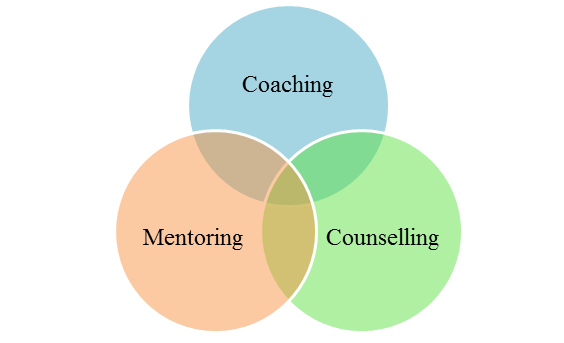Finding a mentor can be a challenge for many junior academics because some supervisors don’t have time to mentor researchers. If you are seeking a mentor, I can’t tell you what to look for in a mentorship, but I can tell you what I look for in it. If it inspires you to act or clarifies things for you, please share them using the comments section below.
What’s the difference?
I am a big believer in mentoring / coaching. I use those terms interchangeably because of the great overlap between them (Figure 1). For me, mentoring is about giving advice, information or direction. Coaching is about setting goals, prioritizing and finding motivation to stick with the task. Counselling goes deeper than mentoring or coaching and it may deal with emotions or childhood.
Internal or external?
It’s great that you are seeking a mentor. We all need one (or two). An external mentor, who’s not an academic doesn’t always understand the fine points of your career track, which may be an advantage. On the other hand, an internal mentor may be too focused on the career track and hesitating to see where your life is going as a whole.
Some universities have internal mentoring programs, others offer coaching as well. For example, the Faculty of Medicine at University of British Columbia (UBC) has a peer mentor program, a career planning program, a research mentorship program and a rural physician mentoring program. UBC’s free coaching services can be accessed through this web link: http://www.hr.ubc.ca/coaching/
What do you want in a mentor? What are you really looking for?
If the “top athletes and singers have coaches”, as Atul Gawandewrites, why should you?
What I want from mentoring is to have someone with whom I can discuss where my life is going, where my work is going, where my passion lies and how to integrate them all.
Academic or non-academic, a mentor should be able to help distance myself from the immediate tasks and focus on the bigger picture; my life as a whole, not just work.
Other people may need a mentor to talk about the following questions:
What to do after my current contract expires?
How to invest my time, energy and money according to that?
How to supervise and mentor junior colleagues?
Some help with writing would be welcome too.
How much does it cost?
Mentoring is generally free. If you have to pay for mentoring, there may be a way to get this reimbursed via university/employee assistance programme or some low-cost options. Accessing Employee Assistance Program is a good option, if you can find someone who does career coaching/counselling. At UBC, there is a specific provider (Homewood Solutions) and you have to ask for counselling and then see if you can have a mentor.
Are you female?
Gender matters in academia. For example, if you are a female academic in Vancouver, BC, you may be able to access an academic mentor via an organization called SCWIST (Society of Canadian Women in Science and Technology), or the UBC Postdoctoral Association (President, Dr. Grace Lee).
Has this post clarified anything for you and what you are looking for in mentorship? If yes, please share your thoughts in a comment section below.
***
Further reading
